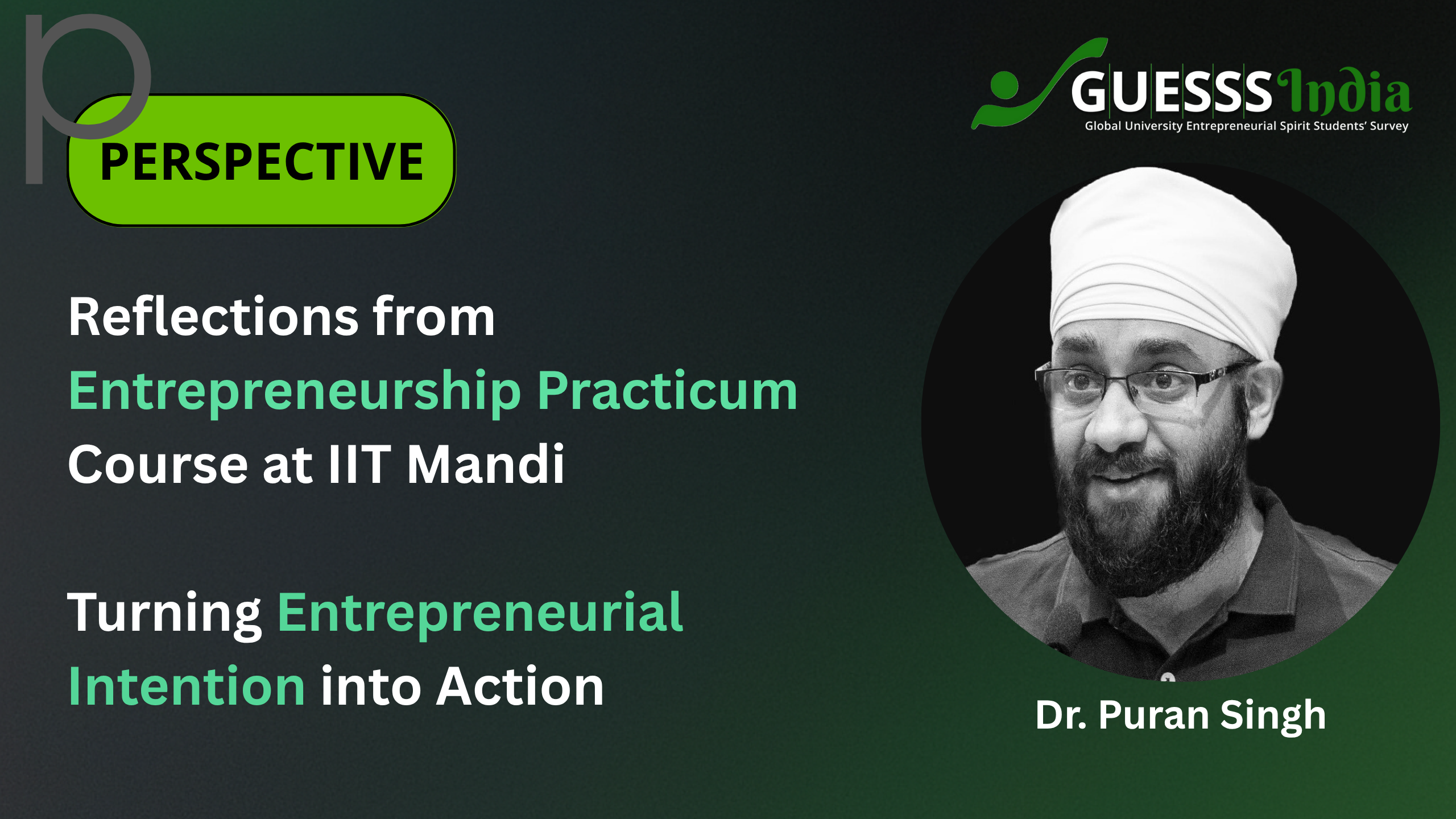India’s National Education Policy (NEP) 2020 and the National Innovation and Startup Policy (NISP) 2019 have set ambitious goals to promote entrepreneurship within higher education institutions. These policies aim to foster a robust entrepreneurial ecosystem by encouraging universities to nurture innovation and support student-led startups. However, despite this strong institutional push, findings from the GUESSS 2023 report tell a different story. While 38% of students report working on startup ideas, only 5% have taken the leap to establish active ventures. This raises a critical question: Why are so many students still hesitant to convert their ideas into real businesses? In this article, I reflect on entrepreneurship education and pedagogy as a standalone factor contributing to the low proportion of active student ventures.
During my tenure as the head of the incubation center at IIT Mandi, I observed a significant gap: despite being a prestigious institution, only 10% of incubated ventures originated from within. This led me to ask—why weren’t more students pursuing entrepreneurship, despite the availability of resources and visible potential? We experimented with a full-semester entrepreneurship course, but found that while informative, the traditional format often failed to inspire actionable outcomes among students.
To address this challenge, we pioneered an Entrepreneurship Practicum—a two-phase course combining theory with practice. Twelve student teams enrolled. The first phase condensed essential entrepreneurial frameworks into a focused 14-hour, studio-style training delivered over one intensive week before the semester began, ensuring students’ undivided attention. During this phase, teams developed their problem statements, conducted user research, and prepared an idea validation plan.
At the end of Phase 1, four teams with stronger problem definitions were selected for Phase 2. By the time the semester started, these teams were equipped with the necessary theoretical foundation to begin building their ventures. Each received a small grant of INR 50,000 for prototyping and validation. Weekly mentoring by the incubation center and monthly industry mentor interactions followed. The students, fully engaged, built prototypes and piloted their solutions on the IIT Mandi campus.
The entire ecosystem was activated to support them—access to labs, faculty, industry mentors, finance, time, and academic credit. The academic credit component allowed students to reduce their regular course load, freeing up time for venture development. This nurturing environment enabled a swift and meaningful transition from theory to practice.
By semester’s end, the student teams had validated their ideas and demonstrated strong commitment. Three of the four teams went on to secure larger government grants through the incubation center for further venture development.
The outcomes were both profound and instructive. A shorter, more intensive training followed by real-world action proved effective for aspiring student entrepreneurs. Immersed in venture creation, students moved from intention to action, experienced ownership, and developed entrepreneurial acumen and resilience—key traits for navigating startup journeys. Two students opted out of placements to continue with their ventures. Since then, one founder has attempted two follow-on ventures, another took his startup into the real world, and a third continues to explore new ideas passionately.
If you’re wondering whether these ventures are “successful,” I would say—that wasn’t the goal. The goal was to help students experience the venture-building process and develop entrepreneurial self-efficacy. We simply let them loose in the world—better prepared, more confident, and hungry for more.
Transforming entrepreneurship education requires bold experimentation and a deliberate shift towards experiential learning models like this. By equipping students with the tools, resources, and mindset necessary to embark on entrepreneurial journeys, institutions can foster a thriving ecosystem where innovation flourishes and dreams take flight.
As we look ahead, it is imperative that institutions collaborate with ecosystem stakeholders to integrate action-oriented pedagogy into entrepreneurship curricula. The objective should not be the immediate success of ventures, but rather the development of students’ capacity to independently explore and pursue entrepreneurial opportunities. These young entrepreneurs will be the nation builders of tomorrow.



9 Responses
Very informative article and the story of practicum courses moved me. Thank you for this article sir.
A valuable contribution to the topic.
Peso789, has some interesting games, but I wish there was more variety. Site’s easy enough to navigate. Something for everyone i guess. See for yourself peso789.
Heard about sv288com.net. Might be your thing depending on what you’re looking for. Check it out here: sv288com
Wow, this post is nice, my younger sister is analyzing such things, so I am going to convey her.
Hi, yeah this article is in fact good and I have learned lot of things from it regarding blogging. thanks.
I wanted to thank you for this great read!! I definitely loved every little bit of it. I have got you saved as a favorite to check out new stuff you
Well I sincerely liked reading it. This subject provided by you is very useful for good planning.
xyiiaqz the effects of cialis sywuaqbby